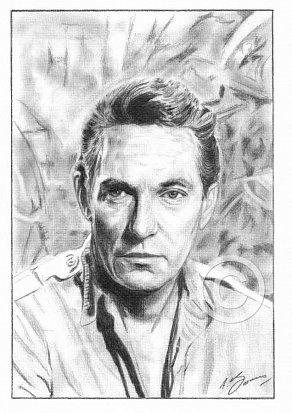Peter Finch
Pencil Portrait by Antonio Bosano.

Shopping Basket
The quality of the prints are at a much higher level compared to the image shown on the left.
Order
A3 Pencil Print-Price £20.00-Purchase
A4 Pencil Print-Price £15.00-Purchase
*Limited edition run of 250 prints only*
All Pencil Prints are printed on the finest Bockingford Somerset Velvet 255 gsm paper.
P&P is not included in the above prices.



Comments
Mention the word “hellraiser” and the names O’Toole, Harris and Burton readily spring to mind. In a rather more understated fashion, one could include the name Peter Finch.
At the turn of 1977, his film career was once again in the ascendency. Having recently completed filming on an excellent television movie, “Raid on Entebbe,” he was doing the obligatory rounds of US network interview shows to promote “Network,” his latest motion picture. He hated such promotion but in this case was almost glad to do it because he believed so strongly in the film and thought he could win an Oscar. He was pretty excited, drinking way more than he should and tired when on January 13, 1977, he appeared on “The Tonight Show.” Johnny Carson and others commented on how worn out he looked but laughed at his jokes, one of which included something about dying of a heart attack.
The following day in the lobby of the Beverly Hills Hotel that’s exactly what he did. He was only sixty, but a liver function test would have told a different story. It had been after all, one hell of a life, and poignantly he would win the best actor Oscar award two months later and to this day, is still the only person to do so posthumously.
Whether portraying pugnacious or rather emotionally weak characters, he always excelled, whatever the quality of the script. When the elements happily coalesced, he would leave behind a legacy of celluloid work to be proud of, as five BAFTAs aptly testifies. “A Town called Alice,” “The Battle of the River Plate,” “The Shiralee,” “The Nun’s Story,” “No love for Johnnie,” “The Pumpkin Eater,” “Girl with Green Eyes,” and “Sunday Bloody Sunday.” A personal favourite of mine is his solitary stint for the Disney organisation in “Kidnapped,” in which he starred as Alan Breck, who joins forces with David Balfour (James MacArthur) in an exciting quest on land and sea for a young man’s rightful inheritance.
Finch spent his teenage years in Australia where he developed an interest in acting. He appeared in various stage productions in Sydney, before gaining work in several radio plays for the Australian Broadcasting Commission.
Following World War II, he would establish himself as Australia’s leading actor in radio. He co-founded the Mercury Theatre Company in Sydney, through which he came to the attention of Laurence Olivier, who encouraged him to move to London.
He achieved success in the London theatre under the mentorship of Olivier, and by the early 1950s was also gaining popularity as a film actor. Throughout the rest of the decade Peter became one of the top ranked film stars of the British cinema, and won the BAFTA award for best actor for his roles in A Town Like Alice and The Trials of Oscar Wilde.